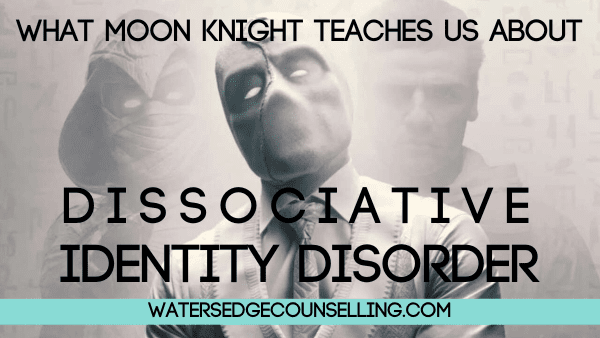
In a (cinematic) world of superheroes, we have slowly seen characters on the big screen wrestle with mental ill health. After all, saving the world has to cause anxiety or trauma, right? Iron Man experienced PTSD, the Scarlet Witch had delusions, and many fictional heroes carry a sense of isolation or depression.
Enter Moon Knight. The latest iteration of the Marvel Cinematic Universe, this beloved comic book hero was finally given its own TV series on Disney Plus and with it, a portrayal of Dissociative Identity Disorder (DID) – formerly known as Multiple Personality Disorder. That’s right – this superhero, who garners his power from the Egyptian god Khonshu, lives with multiple personalities. Steven Grant – the bumbling, museum shop sales attendant with a polite English accent. And Mark Spectre, the American mercenary who is always ready for the next adventure or threat.
So what can we learn about Dissociative Identity Disorder from Moon Knight? DID is a complex condition, and diagnosis can only come from specialists in the field. But this TV show did characterise some of the building blocks of this condition, equipping us to better support the people in our world who live with it.
Here are four things Moon Knight teaches us about DID (Warning, some spoilers ahead):
1. People with Dissociative Identity Disorder live with two or more distinct personalities states
These are called alters or multiples. The DSM-5 describes this as ‘a disruption of identity,’ and some may have a main personality which is passive, dependent or depressed. In Moon Knight, this appears as ‘Steven’ – even though we later learn this is an alternate identity created by Mark as a form of survival. Each identity has its own mannerisms, personality, traits and preferences, and they may differ in age and gender. These personalities won’t always cooperate with each other – resulting in people ‘waking up’ in different places (episode 1).
2. Often, DID begins as a result of childhood trauma, but many people are only diagnosed as adults
Studies show that children who experience emotional neglect, sexual abuse or violence are at higher risk of DID. On Moon Knight, this is displayed in episode 5 when we see that a traumatic incident from Mark’s childhood causes him ongoing abuse, so he develops an alternative personality (Steven) to avoid pain. DID can display itself in children through traumatic memories or dreams, dissociation (which we see Steven/Mark do whenever they switch identities), becoming triggered, physical reactions and changes in behaviours and preferences. As children with DID become adults, their symptoms can strengthen.
3. The symptoms of DID in adults can be severe
Adults living with DID can have a sense of “losing time” and live with confusion. They can frequently feel detached from the world, have memory gaps, or act out of character. Before Steven realises he has an alter identity, he constantly loses time and has memory gaps. It means he is distressed at work and in relationships (another symptom), even though he tries his best to contain his forgotten behaviour by preventing himself from leaving his bed at night. Ultimately, that is when he alters to Mark who has a completely different life and set of relationships. It’s important to note that a diagnosis of DID includes having amnesia or chaotic behaviour not caused by alcohol or drugs, and that any disturbances are outside the norm of age or culture. This is certainly the case in Moon Knight, where Steven initially alters back to Mark when he enters his sleep state. However, while Mark is a mercenary, people who live with DID rarely have an inherently violent alter.
4. People can live a full, healthy life with DID, and learn how their identities co-exist and work together
An essential part of this is receiving a diagnosis and a treatment plan. This includes assessing what triggers a change in identity and learning to manage it. In Moon Knight, we see Steven and Mark learn to co-exist through episodes 4 and 5. By gaining a mutual affection and understanding of each other, they are able to work together and eventually utilise each other’s strengths to overcome the villain. Rather than fighting each other, they become each other’s allies, and in doing so comprehend the childhood trauma that brought them to this place. It makes the hero Moon Knight more powerful than ever.
This article was written with the assistance of Medical News Today.
Do you want to improve your mental health? Contact Colleen on 0434 337 245 or Duncan on 0434 331 243 for a FREE 10-minute phone consultation on how we can best help you, or press book now.
Leave a Reply